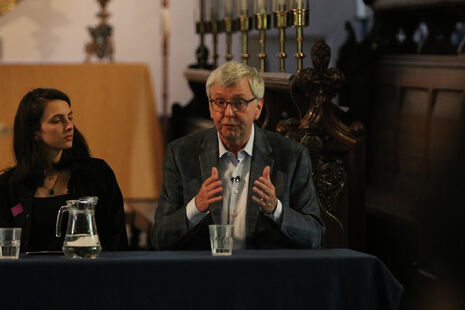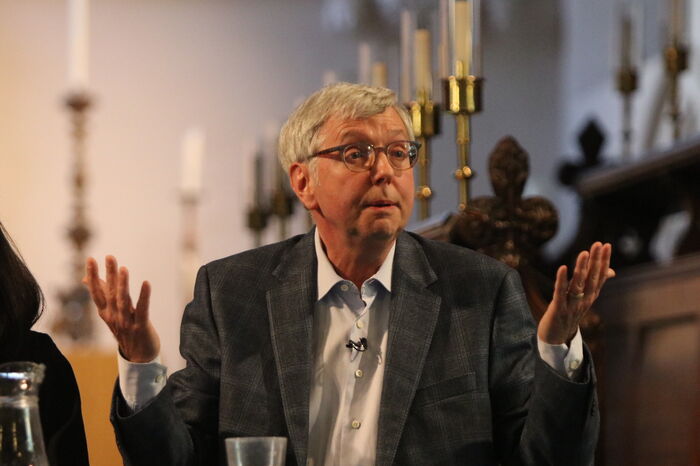Don’t swallow Toope’s hollow rhetoric
Following Vice-Chancellor Stephen Toope’s open meeting with Cambridge staff and students, Jakob Gomolka argues that the movement for a more democratic and transparent University is far from over

It took four weeks of strikes, student solidarity and the partial occupation of a central administrative building for Vice-Chancellor Steven Toope to agree to an open dialogue with the students and staff he is supposed to represent.
The result – a 90-minute meeting in a packed church – was a victory, but a pyrrhic one. The largely unprecedented move to consult the staff and student body and the promise to continue to do so with a second meeting in Easter term is without doubt favourable and a step towards a more democratic University. But it reminds us of the strained relationship between the University and its administration. Committing to further conversation is necessary, but it is the very least Toope should be doing.
“One cannot help but feel a hollow ring to the chants of ‘this is what democracy looks like’”
It was reassuring to finally see the face of the normally anonymous bureaucracy that governs our University. Toope, cheery and amiable behind his round spectacles, was keen to welcome student participation and explicitly spoke out against the marketisation of higher education. These are wonderful successes for Cambridge Defend Education, the Zero Carbon and all other groups that have been lobbying for a more accountable university. But it appears like most concessions are nominal, if they are concessions at all.
For after the meeting, the unanswered questions loom larger than the answers given. Despite speaking out against marketisation, the Vice-Chancellor said awfully little about how he intends to resolve the pension conflict that has triggered the longest industrial action the University has seen in recent years. The strike is set to go on, and Toope has yet to suggest a compromise that will not involve massive cuts to staff pensions. His interim defined contribution plan is no solution at all, as it still involves the eventual erosion of the current scheme a few years down the line, potentially losing academics most of their pensions.
Thus Toope has essentially failed to address the demands of four weeks of mass protest from staff and students. For comparison, Oxford simply revoked the fateful agreement. With the strike set to go on, students could see their final exams and degrees threatened. That is a major let down by the University administration.
During the open meeting, Toope was better and visibly more comfortable when addressing other issues which the intersectional protest had raised. His support for reworked disciplinary procedures against sexual misconduct, for decolonialisation and against the racist Prevent policy was careful but broadly in line with student interests. But just like his fellow neoliberal Canadian, Prime Minister Justin Trudeau, Toope attempted to avoid responsibility and to brush over his own failures with progressive rhetoric.
Toope, who receives a salary eight times higher than average for Cambridge academics in addition to free residence in a mansion, lamented the lack of funds for increased salaries and sustained pensions despite the massive fee spikes for students a few years earlier. His quickly withdrawn suggestion that “we receive too little pay – well, not me” was outright grotesque.
Vague promises of fixing the gender pay gap are no substitute for secure pensions and higher salaries. When it came to the question of Cambridge’s huge endowment, Toope continued to justify morally questionable indirect investments in fossil fuels through ‘funds of funds’. Instead of delivering action, Toope promised talk. But stressing willingness to speak to students is a farce considering it took the Old Schools occupiers quite literally knocking on the door of Toope’s office for him to finally step out. Emphasising the need for conversation cannot hide the failure to implement actual changes and to make commitments to divestment. Toope’s evasion of questions and referral to decision bodies outside of his control continues a University trend of delay and a lack of transparency.
If Toope wants to regain credibility, he should have a hard think about how he can reconcile his alleged inability to initiate any meaningful changes and to save pensions with his grossly high salary. He needs to promise to divest, like other universities have, instead of hiding behind opaque portfolios. And he needs to institutionalise regular meetings with students and senior figures responsible for major decisions to make the university truly transparent.
Until then, most of his promises are worthless and one cannot help but feel a hollow ring to the post-open meeting chants of “this is what democracy looks like”
 News / Cambridge study finds students learn better with notes than AI13 December 2025
News / Cambridge study finds students learn better with notes than AI13 December 2025 News / Cambridge Vet School gets lifeline year to stay accredited28 November 2025
News / Cambridge Vet School gets lifeline year to stay accredited28 November 2025 Science / Did your ex trip on King’s Parade? The science behind the ‘ick’12 December 2025
Science / Did your ex trip on King’s Parade? The science behind the ‘ick’12 December 2025 News / Uni Scout and Guide Club affirms trans inclusion 12 December 2025
News / Uni Scout and Guide Club affirms trans inclusion 12 December 2025 Arts / Modern Modernist Centenary: T. S. Eliot13 December 2025
Arts / Modern Modernist Centenary: T. S. Eliot13 December 2025








